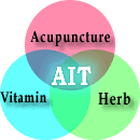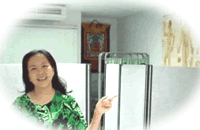|
|
|
 |
 |
 |
||||
|
|
|
1.What is Acupuncture or Acupoint-injection Therapy (AIT) ? Acupuncture or Acupoint-injection is method of encouraging the body to promote natural healing and to improve functioning. Acupuncture is done by inserting needles at very precise acupuncture points. AIT is a combination therapy, using solutions of vitamins and Chinese herbs directly injected by hypodermic syringe into case-specific acupuncture points 2. How does acupuncture or acupoints-injection work? The
Traditional Chinese Medicine explanation is that channels of energy
run in regular patterns through the body and over its surface. These
energy channels, called meridians, are like rivers flowing through
the body to irrigate and nourish the tissues. An obstruction in the
movement of these energy rivers acts like a dam blocking energy to
other parts of the body. 3. What is the scope of acupuncture and acupoint-injection? This
is a system that can influence four areas of health care: 4. What's the difference between acupuncture and acupoint injection therapy (AIT)? 1).
Patients who receive acupuncture have to lie down on the bed for about
30 minutes and take some herbal medicine at home. However patients
who receive acupoint injection just lie down on the bed for a few
minutes without taking any medicine at home. This is because we choose
suitable herbs or vitamins to directly inject into acupoints in tinny
dosages.
The
clinical results indicate that this combination therapy can strengthen
the immune system, bring back or build up the body's systems, organs
and tissues' function by regulating cell function and cellular regeneration
of damaged cells. The fact is that AIT can operate on every part of
the body (acupuncture points are all over the whole body). Faced with
different diseases or problems or complications, we can always find
acupuncture points to deal with them. According to the patient's situation,
we can choose a suitable medicine ( we use Chinese herbs and vitamins)
to perform the stimulant role instead of acupuncture needles. That's
why AIT is useful for a wide variety of conditions. AIT is a kind of fundamental treatment. Once you get your body's foundation of health strong, no disease can attack you and even when a disease comes to attack you, your body can defend itself well. 7. What is Integrative Chinese Western Medicine ( ICWM )? The
modernization movement brought Traditional Chinese Medicine into every
medical school in China, to be taught along with Western medicine.
The same doctors for the same patients in the same medical settings
have practiced it side by side with Western medicine. For most clinical
conditions, these two medical approaches are used together, and the
results are usually better than either would have achieved if used
alone. As part of this movement, many Western-trained doctors have
devoted tremendous amounts of time and energy to scientific studies
of TCM, using scientific methods to prove the effectiveness of Chinese
herbs and acupuncture, which is resulting in a new type of medicine:
Integrative Chinese and Western Medicine (ICWM). 8. How was Traditional Chinese Medicine Modernized? One
method used to modernize TCM was the creation of a terminology of
pathophysiological diagnosis to match TCM's constitutional diagnosis
and phytopharmacology (pharmacology of botanical products) to match
the terms of Chinese herbology and acupuncture theory. In this way,
language barriers between these two medical systems have gradually
been overcome. 9. Why do most western medical doctors remain skeptical about TCM? The
skepticism voiced against Traditional Chinese Medicine has not surprised
me. I myself had the same reaction when I was first introduced to
TCM. In China during the third year of medical school, when we had
already learned anatomy, histology, biochemistry, and pathology, we
had to take one term to study the basic theory of TCM. What are yin
and yang? What is the Five Elements Theory? What is acupuncture? We
had to learn the basic therapy of TCM and some other Traditional Chinese
Medicine concepts. We had to pass a strict examination before we could
move on to further study. Even then we still remained our skepticism.
We looked down on this "unscientific" medicine. When we
had become residents and were faced with many practical difficulties,
there were oftentimes when we found that we had no choice but to consult
a TCM professor to seek help. Only then did we discover for ourselves
that it really worked. So I went to Yunnan Traditional Chinese Medical
school for further study and to practice TCM part- time. Reflecting
back on my own early skepticism and ultimate embracing of TCM, I can
well understand the suspicion of TCM by many Western-trained physicians. |
| Note: The information provided on this website is for informational purposes only and is not intended to be used as medical instruction, it can not be as a substitute for advice from your physician. The appropriate health care professionals should be consulted before taking any action. |
|
|